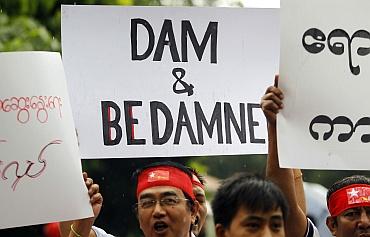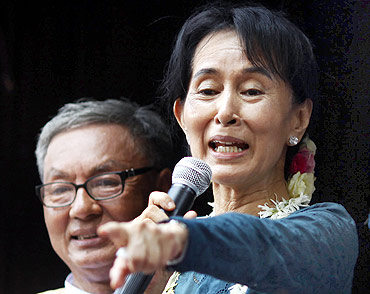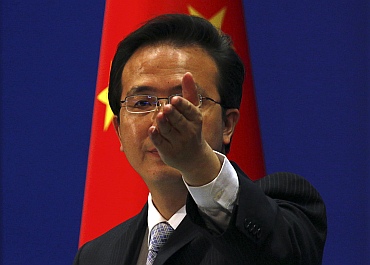 | « Back to article | Print this article |
Myanmar shelves Kachin dam project, irks China
The Myanmar government's announcement on September 30, 2011, about the suspension of its plans to build a massive dam on the IrrawaddyRiver in the NorthernKachinState, seems to have annoyed China, writes B Raman.
The decision, which was in response to a public outcry over the controversial project in the Kachin state and from environmentalists, marked the first time a government has re-visited plans for undertaking a project with Chinese assistance without worrying about any adverse reaction from China to the decision.
This is also the first time that the government of President Thein Sein, which came to office in March last, has responded to public pressure and to representations from pro-democracy leader Aung San Suu Kyi against a Chinese-aided project.
For some months, there have been similar pressure and protests from the people of the Arakan area against the award of contracts to Chinese oil and gas companies for the exploration of oil/gas in the Arakan area, and for the construction of pipelines and a railway line from there to Yunnan.
The decision to suspend a major Chinese-aided project in the Kachin State in response to public pressure may be a shot in the arm to those opposing the Chinese projects in the Arakan area.
While announcing the decision to suspend the construction of the $3.6 billion Myitsone Dam, Sein said in a message to the Parliament in the capital Naypyidaw, "We have to respect the will of the people as our government is elected by the people. We have a responsibility to solve the worries of the people so we will stop construction of the Myitsone Dam during our current government."
According to those opposing the project, it will mainly benefit the Chinese in Yunnan. They also say that the 3,600 megawatt Chinese-inspired project would submerge dozens of villages, displace more than 10,000 people, and destroy the area's ecology.
Earlier this year, the Kachin Independence Organisation had terminated a 17-year ceasefire agreement with the government in protest against the project and warned that it would forcibly block the project undertaken by the China Power Investment Corp.
Click NEXT to read further...
It's good to listen to the people's voice: Suu Kyi
Suu Kyi, who vehemently opposed the project and has launched a signature campaign against it, and organisations of students and Buddhist monks have welcomed the decision of the government.
Suu Kyi has been quoted as saying, "It's good to listen to the people's voice. That's what all governments should do."
Suu Kyi had warned in a recent statement that fault lines in the vicinity of the dams and the sheer immensity of the reservoir raised the specter of "horrendous devastation in the event of an earthquake."
According to her, another danger was the "serious problem" from a weakened flow of the waters of the lrrawaddy -- the intrusion of salt water into the delta.
Aung Wah of the Kachin Social Network said the Government needed to do more to protect the Irrawaddy from ecological devastation.
He added, "There are another six mega dams under construction or planned on the N'mai and Mali rivers which will export electricity to China and will have the same effect as the Myitsone dam." He was referring to the two rivers that form the headwaters of the Irrawaddy.
The Burma Rivers Network, formed by groups representing the local communities, has called on the government to immediately cancel the other six dams planned on the Irrawaddy source rivers, which, it said, "will have the same devastating impact on the country."
It has urged the people of Myanmar to "demand an official declaration and pull-out of all personnel and equipment from the dam site by the project-holder, China Power Investment."
The previous military government had kept secret an environment assessment report, which had warned against the Chinese-inspired projects.
The report has recently been leaked to the public by whistle-blowers in the government. It warned, "The fragmentation of the Irrawaddy River by a series of dams will have serious social and environmental problems not only upstream of dams but also far downstream in the coastal area. There is no need for a huge dam such as the Myitsone to be constructed on the waterway."
Click NEXT to read further...Matters should be settled through friendly consultations: China
The Chinese government, which has been taken by surprise by the decision of the Myanmar government, has made no secret of its displeasure.
Chinese Foreign Ministry spokesman Hong Lei said during the daily press briefing in Beijing, "The Myitsone hydropower plant is a China-Myanmar jointly invested project, which has gone through scientific feasibility studies and strict examinations by both sides.
"Relevant matters that have emerged during the implementation of the project should be properly settled through friendly consultations between the two sides. The Chinese government always supports its enterprises to cooperate with foreign companies on a basis of mutual respect, equality and mutual benefits, and orders Chinese enterprises to strictly perform their duties and commitments according to laws and regulations of the countries where they work," he said.
The Myitsone hydropower project is a joint project of the China Power Investment Corp, and Myanmar's Ministry of Electric Power-1 and the local private Asia World Company. The construction, which was started in December 2009, was to be completed in 2019.
The decision of the present Myanmar government, which consists largely of retired military officers, has political significance. It shows that the government does not consider itself bound to implement the controversial decisions of the previous military dictatorship. It remains to be seen whether Beijing will use its influence in the Myanmar Army to have the decision reversed.

